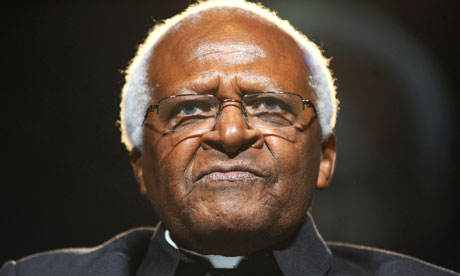The archbishop taught that to sit with one's enemies was a key aspect of reconciliation – yet he offered Blair only an empty chair
 Giles Fraser
Giles Fraser 
'Desmond Tutu’s decision smacks too much of the sort of thinking that he has, in other contexts, done so much to dismantle.' Photograph: Zak Hussein/PA
I marched against the war in Iraq. It was unjustified and wrong: no ifs, no buts, no qualifications.
I feel the need to say this because in questioning Desmond Tutu's decision to empty-chair Tony Blair at a South African seminar, some will assume it is some sort of apologia for the war. It is not. But not being a lawyer, I suspend judgment on whether a crime was committed. Was there a mens rea – legal speak for a "guilty mind"? I don't know. The difference between Blair lying and Blair being mistaken about the presence of weapons of mass destruction does not seem to me to be straightforward. The psychology of self-delusion and group-think and confirmation bias makes this a question with many parts.
Nonetheless, I do suspect there may well be some sort of legal case to answer. Surely, UN resolution 1441 was not sufficient legal justification for full-scale war. And while it is indeed troubling that the International Criminal Court mostly seems to call to account dictators with brown skin, Tony Blair is not in the same moral category as Charles Taylor. The war in Iraq was not a systematic genocide or ethnic cleansing. All of this may well be tested in court one day. And that would be fine with me.
My problem is with the empty-chairing. One of the things that many of us most admired about South Africa's post-apartheid Truth and Reconciliation Commission was that it brought former enemies together in the same room. The idea that there is some sort of moral contamination that comes from frequenting with those who have done wrong is not a Christian one.
Mandela sat down with De Klerk, Blair sat down with the IRA, and one day the US will have to properly sit down with Taliban. Indeed, Jesus was often attacked for sitting down with those that morally respectable people had decided were beyond the pale. Those who cry out that this offends against decency are often more concerned with protecting their own innocence than they are with finding a way forward. Yes, reconciliation is about truth-telling (and Tutu could have done that to Blair's face) but it is also about being in the same room.
The reason I recoil at Tutu's decision is that it smacks too much of the sort of thinking that he has, in other contexts, done so much to dismantle – the idea that it is the purpose of morality to make one feel better about oneself, to feel that one is on the right side, that one is with the angels. But morality is not about having clean hands. When it comes to Iraq, the fact that most of us have lifestyles dripping with oil cannot be insignificant. Oil and blood are mixed together in the unholy eucharist of modern life. This is the cup from which we all drink. How can we ostracise those presiding at this feast if we are also drinking from the same cup?
Blair did much that was good – not least his work in Northern Ireland – though he must own his shadow side like the rest of us. And, as a Christian, he knows that there will be no immunity from prosecution in the larger scheme of things. But this is no reason not to sit with him. Justice is about truth and reconciliation and not just the intoxicating serotonin of retribution. The reason I find this whole affair unsettling is that Tutu was the person who did most to teach us that.
I feel the need to say this because in questioning Desmond Tutu's decision to empty-chair Tony Blair at a South African seminar, some will assume it is some sort of apologia for the war. It is not. But not being a lawyer, I suspend judgment on whether a crime was committed. Was there a mens rea – legal speak for a "guilty mind"? I don't know. The difference between Blair lying and Blair being mistaken about the presence of weapons of mass destruction does not seem to me to be straightforward. The psychology of self-delusion and group-think and confirmation bias makes this a question with many parts.
Nonetheless, I do suspect there may well be some sort of legal case to answer. Surely, UN resolution 1441 was not sufficient legal justification for full-scale war. And while it is indeed troubling that the International Criminal Court mostly seems to call to account dictators with brown skin, Tony Blair is not in the same moral category as Charles Taylor. The war in Iraq was not a systematic genocide or ethnic cleansing. All of this may well be tested in court one day. And that would be fine with me.
My problem is with the empty-chairing. One of the things that many of us most admired about South Africa's post-apartheid Truth and Reconciliation Commission was that it brought former enemies together in the same room. The idea that there is some sort of moral contamination that comes from frequenting with those who have done wrong is not a Christian one.
Mandela sat down with De Klerk, Blair sat down with the IRA, and one day the US will have to properly sit down with Taliban. Indeed, Jesus was often attacked for sitting down with those that morally respectable people had decided were beyond the pale. Those who cry out that this offends against decency are often more concerned with protecting their own innocence than they are with finding a way forward. Yes, reconciliation is about truth-telling (and Tutu could have done that to Blair's face) but it is also about being in the same room.
The reason I recoil at Tutu's decision is that it smacks too much of the sort of thinking that he has, in other contexts, done so much to dismantle – the idea that it is the purpose of morality to make one feel better about oneself, to feel that one is on the right side, that one is with the angels. But morality is not about having clean hands. When it comes to Iraq, the fact that most of us have lifestyles dripping with oil cannot be insignificant. Oil and blood are mixed together in the unholy eucharist of modern life. This is the cup from which we all drink. How can we ostracise those presiding at this feast if we are also drinking from the same cup?
Blair did much that was good – not least his work in Northern Ireland – though he must own his shadow side like the rest of us. And, as a Christian, he knows that there will be no immunity from prosecution in the larger scheme of things. But this is no reason not to sit with him. Justice is about truth and reconciliation and not just the intoxicating serotonin of retribution. The reason I find this whole affair unsettling is that Tutu was the person who did most to teach us that.
No comments:
Post a Comment